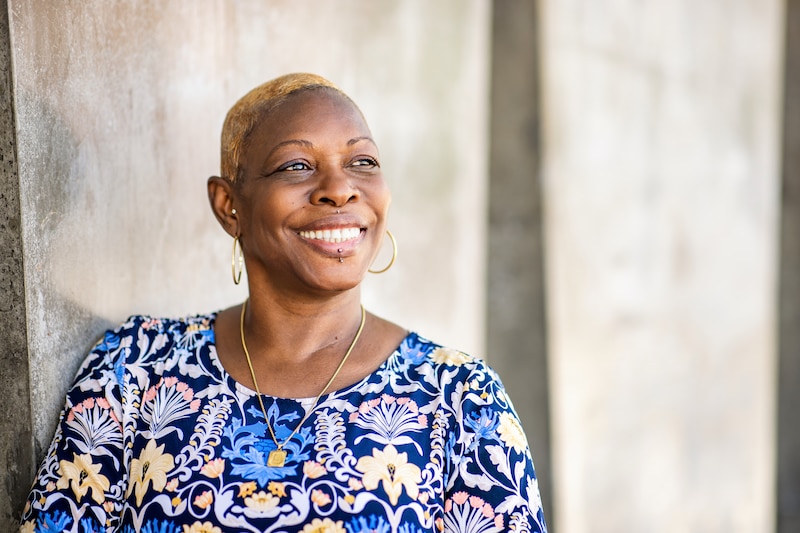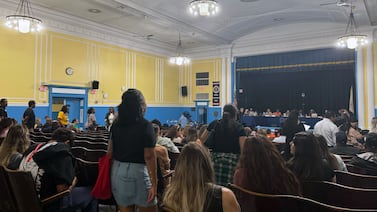Beyond High School is our free monthly newsletter covering higher education policy and practices in Colorado. Sign up to get it delivered to your inbox early.
One of the highlights of Lisa Johnson’s life came when she walked across the stage at Metropolitan State University of Denver last year after earning an associate degree.
The 60-year-old was the first of her siblings to earn a college degree, an achievement she feared would never happen.
“I was over the moon,” Johnson said.
But a busy life filled with a job and kids, a reluctance to amass debt, and health issues have kept Johnson from taking the next step: reenrolling in college to complete her bachelor’s degree.
Going on to get a bachelor’s degree was a goal state lawmakers had in mind in 2021 when they launched a $1 million program, called Colorado Re-Engaged, which allowed Johnson to get an Associate of General Studies. The program gave universities the ability to grant the degree to about 25,000 adults who had previously dropped out of college after having earned enough credits for an associate. They hoped those adults would then be positioned to complete a four-year program for a bachelor’s degree, a credential that leads to far greater financial growth than a high school diploma or associate degree.
While the program has given former students recognition for their time and money, students aren’t returning to finish a four-year degree. That’s partly because the program doesn’t help students with their second attempt — unlike a similar program called Finish What You Started, which was launched by lawmakers at the same time and has had greater success at attracting former students back to college.
Of the more than 1,500 Coloradans who have been awarded an associate degree through Re-Engaged, only about 40, or 3%, have reenrolled to finish their bachelor’s degree, according to data obtained by Chalkbeat Colorado through open records requests.
Meanwhile, a recent state report shows Finish What You Started, created through the same legislation, prompted about 4,700 Colorado adults with some college credits but no degree to reenroll to finish either their associate or bachelor’s degree. Of that number, about 2,000 returned to four-year universities, and about 600 students have successfully completed a four-year program so far, according to a state report.
The biggest difference between the two programs has been funding.
Finish What You Started was created with $49 million in federal pandemic relief dollars to provide direct and indirect support for students, such as financial aid and career and academic advising. That’s compared to Colorado Re-Engaged, launched with $1 million in federal pandemic money but without that type of support.
Making matters more complicated, students who received a Re-Engaged associate degree couldn’t get financial aid through Finish What You Started support because the law excluded students who already held a degree from the more supportive program.
“The legislation even in its name — the Re-Engaged initiative — is an assumption that people as individual operators in the world are going to want to reengage with higher education,” said Shaun Schafer, associate vice president of curriculum, academic effectiveness, and policy development at Metropolitan State University of Denver. “Surely, you don’t need anything to make that happen. They’ll just want it.”
“And that’s a wonderful theory, but I think we’ve got proof that’s not exactly how people act.”
A goal to get more former college students back on track
Dropping out of college is a common experience.
According to National Student Clearinghouse numbers, 757,000 Coloradans, including 620,000 residents under the age of 65 in Colorado, or about 13% of the state’s population, have some college but no degree.
Lawmakers hoped federal pandemic relief money could help lower that percentage and also prop up colleges and universities, improve education outcomes, and strengthen the workforce. They wanted the Re-Engaged program to reach about 25,000 adults who had earned at least 70 college credits, or the equivalent of an associate degree, before dropping out.
Finish What You Started was intended to serve adults who might have fewer college credits — at least 36 — and leverage federal, state, and local resources to help them reenroll to get either an associate or a bachelor’s degree.
Bureau of Labor Statistics numbers show having an associate degree only yields about $70 more per week in wages when compared to having some college and no degree. Associate degree holders are also slightly less likely to be unemployed.
A bachelor’s degree provides a big benefit. Someone with a bachelor’s degree earns almost $450 more a week on average than someone with an associate degree, according to Labor Statistics numbers.
Peter Fritz, who oversees the Re-Engaged program at the Colorado Department of Higher Education, said earning an associate degree has provided Re-Engaged recipients with a sense of personal accomplishment. The program also helped the state receive national recognition for getting associate degrees into the hands of those students.
“It’s not a huge advantage economically for them to have an associate degree,” Fritz said. “But I hear a lot of stuff about personal satisfaction and personal accomplishment.”
However, getting adults reenrolled for their bachelor’s degree through the Re-Engaged program has been a major challenge.
“It’s the ‘re’ in Re-Engaged, in getting those students to feel comfortable and like it’s worthwhile for them to reenroll and finish out the bachelor’s degree, that’s the next big challenge,” he said.
National Student Clearinghouse numbers show just 2.3% of Colorado students who previously dropped out of college returned last year, even as the Re-Engaged and Finish What You Started programs have started to boost those numbers. That’s lower than the national average of 2.7%.
The challenges and successes of Colorado Re-Engaged
The MSU Denver ceremony where Johnson received her associate degree might have been a highlight of her life, but she still holds greater aspirations. When she thinks about reenrolling in college, she said the process feels overwhelming.
Many students share Johnson’s experience, university officials said. The main reason most don’t return is financial, they said.
These adults have households and families to support, jobs and other responsibilities like kids to juggle, and many also need help to afford tuition or books. Without it, going back to college is difficult — a reality reflected in the different success rates of Colorado Re-Engaged and Finish What You Started.
The eight universities participating in Colorado Re-Engaged were given $40,000 each to start the program at their campuses. Schools could use the money for marketing and outreach materials.
Collectively, university records show they have reached out to over 7,500 former students through letters, emails, and phone calls.
But although state lawmakers set aside $1 million for the program, only about half of that was spent, according to a state report. For example, Fort Lewis College sent back $16,625 of the $40,000 because the school needed far less to start the program and begin outreach to students. Other schools reported the same.
Meanwhile, the 30 universities participating in Finish What You Started were given several hundred thousands or even millions of dollars to support students. In addition to marketing and personnel, colleges and universities could use the money to help returning students pay their tuition and advise them on which courses to take to advance their careers.
A state report shows of the $49 million set aside for the program, schools spent about $27 million from 2022 to 2024.
The legislation creating Finish What You Started says students who already have a degree or certificate with 30 or more credits are not eligible for those resources.
Universities advised some adults to opt out of getting their associate degree so they could reenroll as a Finish What You Started student, Fritz said.
Despite the financial challenges, Re-Engaged has helped university leaders better understand what older adults need and new ways to serve this population.
For example, MSU Denver has started to provide general studies evening classes from 6 p.m. to 9 p.m. in a bid to help adults work around their schedules and make it easier for them to return, he said. The change is a direct result of learning from Re-Engaged, Schafer said. The school will also keep its financial aid offices open later to help students who work.
The lessons learned are important because of the two programs, Colorado Re-Engaged is the one that will last, with the participating universities planning to continue to award associate degrees. The more expensive program, Finish What You Started, will end in May 2026 because the federal pandemic money has expired.

Johnson said when she thinks about how she got her associate degree, she feels motivated. She wants the same feeling of joy and accomplishment as when she walked across the stage at MSU Denver.
Her goal is to get her bachelor’s degree then go to law school to become a lawyer.
Last month, Johnson said she’d hesitated to reenroll because of recent health complications and worries about college costs. She wished university officials would have reached out to see if she needed help with the process.
But last week, when Chalkbeat asked if she enrolled, she said she felt inspired. She registered on Wednesday at the University of Denver and plans to attend school there in the fall. She said she told herself, “Just go for it.
“And that’s exactly what I am going to do.”
Jason Gonzales is a reporter covering higher education and the Colorado legislature. Chalkbeat Colorado partners with Open Campus on higher education coverage. Contact Jason at jgonzales@chalkbeat.org.




